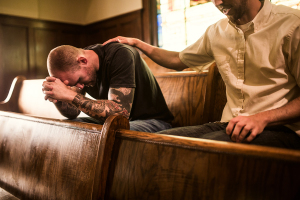3 reasons ‘Gay Christian’ is not a biblically acceptable identity

There is an ongoing debate about whether or not “Gay Christian” is a biblically acceptable identity for a Christian. Dr. Gregory Coles, for instance, has argued in favor of “Gay Christian” identity in his book Single, Gay Christian: A Personal Journey of Faith and Sexual Identity. The question of identity is one that every ministry leader needs to be prepared to answer. Southern Baptist ministry leaders in particular should know at least the following reasons why “Gay Christian” is not a biblically acceptable identity.
First, identity is a matter of dominion. The profession “Jesus is Lord” is a recognition that Jesus has dominion over everything in the universe including all aspects of one’s personal identity. Nothing sinful according to Scripture should be a part of a Christian’s identity because sin no longer defines the believer in Christ. While believers can and do struggle with sin, sin no longer has dominion over a believer. The term “Gay Christian” contradicts that affirmation by carving out some aspect of the self over which Jesus is not Lord. Therefore, “Gay Christian” is inherently contradictory; as if to say “Jesus is Lord” with fingers crossed.
Second, identity is a matter of God’s purpose. All Christians agree that we are sinners saved by grace. All Christians agree that becoming a Christian does not immediately eliminate all sinful desires. All Christians should agree that both actions and underlying desires can be sinful (James 1:14-16, Matthew 5:28, Romans 1:27, etc.). All Christians are in daily need of conviction, confession and repentance.
The doctrine of mortification stems from passages such as Colossians 3:5-10 which call Christians to put indwelling sin to death through repentance and faith. Correspondingly, the doctrine of vivification emphasizes that Christians not only die to sin but also live unto righteousness. Mortification and vivification reflect the “putting-on” and putting-off” language of Ephesians 4:20-24. The term “Gay Christian” wrongly preserves that which God intends to change, celebrates sinful desire that Christians are commanded to mortify, and wrongly identifies a child of God with something that is not life-giving.
Third, identity is a matter of the heart. It is hard to conceive that anyone would want to identify themself with something of which they were ashamed or hated. The term “Gay Christian” inevitably communicates a sense of pride in, or celebration of, same-sex attraction or same-sex activity. Christians are called to speak the truth in love (Ephesians 4:15). It is untrue that a genuine Christian is proud of or celebrates their sinful desires or actions and it would be unloving to give that impression.
The heartfelt desire of a Christian is conformity to Christ. Any Christian, if given the opportunity, would happily exchange what is broken and unlike Christ for what is healed and reflective of Christ. While a person can be born again and still struggle with same-sex attraction, the title “Gay Christian” reflects a heart holding on rather than letting go.
Thankfully, Southern Baptists have taken a stand on the question of same-sex attraction and identity. At the 2019 SBC Annual Meeting in Nashville, Southern Baptist messengers passed a resolution titled “On Sexuality and Personal Identity.” That resolution contains the following helpful wording:
“... we call on all Christians who struggle against same-sex attraction to forsake any self-conception or personal identity that is contrary to God’s good and holy purposes in creation and redemption ...”
The term “Gay Christian” does not accurately reflect the Lordship of Jesus, God’s good purpose in sanctification, or the redeemed heart of a believer to celebrate what is good, true, and right. Sin orientation is not an acceptable Christian identity. Therefore, Christians should not embrace the title “Gay Christian.”
Adam Groza (PhD) is a Vice President and Associate Professor of Philosophy of Religion at Gateway Seminary in Ontario, CA. He is the co-author of Unraveling Philosophy (B&H Academic, 2023) and the author of Faith Wins: Overcoming a Crisis of Belief (New Hope Publishers, 2020). Adam is a research fellow for the ERLC and a teaching fellow for Agricola Theological Institute.




























